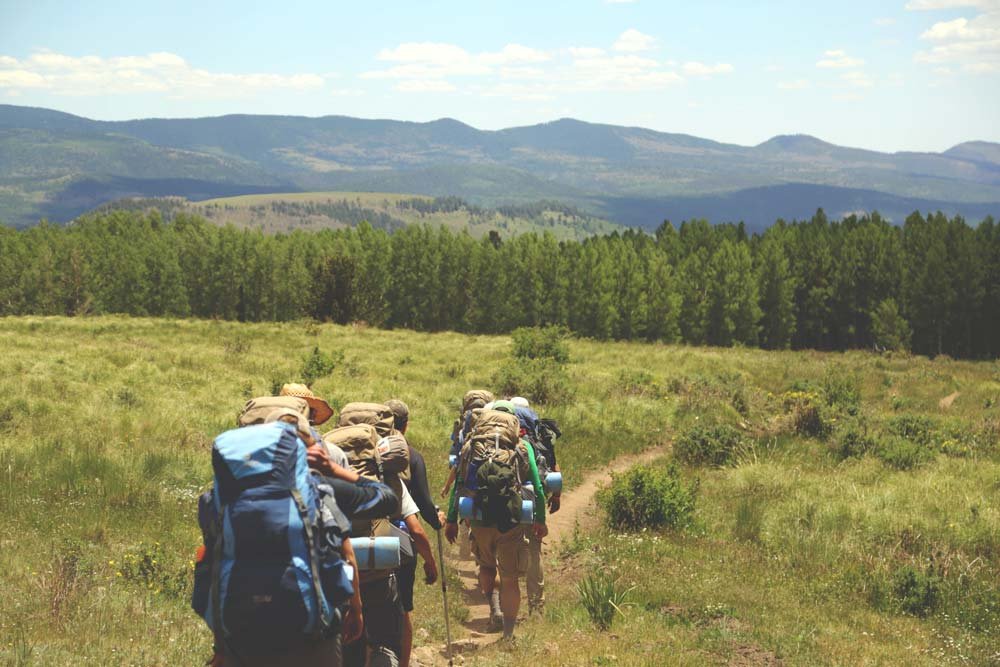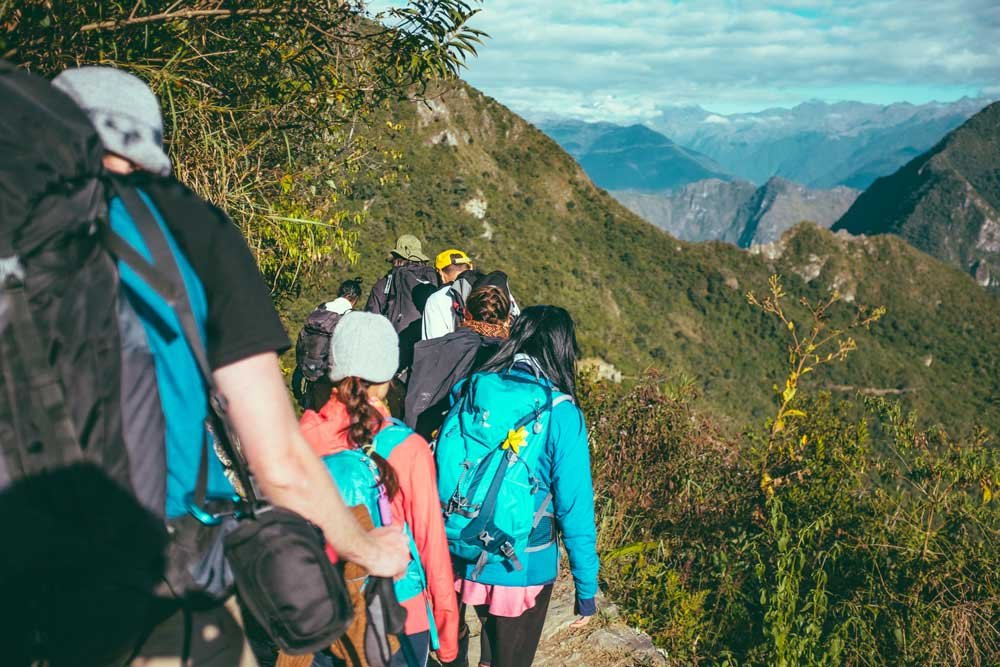Hiking or backpacking is one of the best ways to get out and explore nature. It’s an empowering activity that makes a positive impact on people regardless of their experience, age, and ability. Hiking provides a good workout and recharges your batteries. If you haven’t tried it yet, you definitely should! However, remember that preparing for a long-distance hiking trip is the key to a successful and enjoyable experience.
In this post, we break down everything to help you prepare a plan before a hiking trip. With good planning, you’ll feel more confident, organized, and less overwhelmed while getting ready for your adventure. Keep reading!
TIP 1: Plan Thoroughly Your Hiking Trip

If a hiking trip has been poorly planned, it can be difficult and exhausting, especially for beginners. So, it’s wise to plan everything thoroughly!
Here what you should take care of in advance:
Find friends to hike with
Hiking alone may have its own rewards, though. Having an adventure in a group is always safer and more fun. The ideal group size is four since it’s difficult to keep together on a trail a larger group, plus, they have a greater impact on the environment and can be loud or disruptive to other hikers.
Pick the right trail to hike
You should research trial options. Ensure to choose a trail that is within your abilities. If you are a beginner, pick an easier hiking trip. When you handle it, work up to a harder one, then try to prepare for a hiking trip in the mountains.
Make sure you have enough time to complete your hike
If you rush or try to hike at night, accidents may happen. To prevent it, find out how long it usually takes people to hike and add a bit more time. Also, check what time the sun sets, it’s dangerous to be caught out after dark.
Check local rules and regulations
All attractive hiking places have their own rules and regulations to protect nature. Before you hit the road, do read them! Furthermore, find out whether you need a reservation, permit, park pass, and if dogs or campfires are allowed.
Learn Leave No Trace principles
These principles are must-follow rules for every hiker and anyone visiting outdoors. Their main goal is to minimize negative impacts. Do read them prior to hitting the road!
Research the trail condition and get the weather forecasts
When you prepare for a hiking trip in the mountains or anywhere else, check the trail and weather conditions. You don’t want to get stopped halfway by snow or other conditions. Do research by visiting park websites, hiking groups, and use the site mountain-forecast.com to get weather predictions for high altitude hikes.
Avoid getting lost
Take a trail map and trail description; a GPS is also a brilliant idea.
What about a bathroom?
Check whether there are toilets on the trail, and do pack toilet paper, hand sanitiser, and a small trowel in your pack just in case.
TIP 2: Prepare Physically For A Hiking Trip

Before hiking, you should prepare physically and establish a healthy awareness of your body. It’ll grow your confidence as a hiker and help you feel much better during the trip. Ensure to create a workout schedule of about 12 weeks before your big adventure.
Here are some exercise to prepare for a hiking trip:
● Warm-up – start by taking a 15-minute brisk walk or spend this time on the cross-trainer. Your muscles and cardiovascular system will gradually get ready for the workout session.
● Cardiovascular activities – they are important to build your stamina and endurance. Jogging, jumping rope, dancing, swimming, or any other cardio will help prepare for a hiking trip and make your experience a lot more enjoyable.
● Strength training – focus on increasing the strength in your core muscles, glutes, and legs. Use the best exercise equipment and do resistant exercises like squats and lunges, calf raises – they are a great way to prepare for a high altitude hiking trip.
● Cooldown and perform stretching – 10-15 minutes of the cool-down exercises like stretching allow the body to return to its steady-state and help to avoid muscle soreness.
TIP 3: Prepare Necessary Gear For Hiking Trip
Creating a packing list is a must for beginners. Hiking gear is expensive, so you may want to do a little research and look into buying used gear, borrow it from your friends or keep an eye on sales.
So, what essentials to prepare for a hiking trip?
- Hiking backpack
- Hiking boots or shoes
- Weather-appropriate clothes
- Shelter
- Lots of water
- Lots of food
- First-aid kit
- Navigation tools like a compass, map, and GPS device.
- Knife or multi-tool
- Headlamp and extra batteries
- Fire
- Sun protection
TIP 4: Prepare An Outfit For A Hiking Trip
Make sure to invest in a high-quality outfit that will last you a long time, it’s the key to being comfortable on the trail. Choose moisture-wicking, breathable, and shape retention materials. Don’t go for cotton, which may chafe, absorb sweat, and stretch out over time.
Furthermore, you should prepare for varying weather with the right layers. Get the weather forecast, and remember that the weather at the high altitude can change very quickly. So, you should be ready for the worst!
Here is a list of what you may need:
- Wicking hiking t-shirt
- Warm long sleeve layer
- Packable insulated jacket
- Light windbreaker
- Rain jacket
- Hiking shorts
- Hiking pants
- Rain pants
- Sports bra
- Quick-dry undies
- Wool socks
- Sun hat
- Buff
- Sunglasses
TIP 5: Prepare Food For A Hiking Trip

Hiking will make you hungry. So, you should pack enough food, always have a few extras in your backpack, it’ll be your emergency purveyance. On the other hand, the more you pack, the harder it’ll be to hike. Go for lightweight, non-perishable, yet nutrient-dense products, such as:
- Seeds, nuts, nut-based bars, or nut butter packs
- Trail mix
- Dried fruits and vegetables
- Apples and bananas
- Granola or granola bars
- Energy bars
- Whole-grain bread
- Pouches with tuna salad
- Dried jerky, such as meat, poultry, or salmon jerky
- Ready-to-eat cereal
- Fruit or vegetable puree in a squeezable pouch
- Marshmallows for campfire desserts
TIP 6: Learn Hiking Etiquette
To prepare mentally for a hiking trip, you should learn how not to be a bozo out on the trail.
- If you want to stop to catch a breath, be courteous and move to the side, allowing other hikers to pass.
- Keep conversations with your friends down so that people behind you don’t have to listen to your talks. And don’t talk loudly on the cell phone.
- Listen to music only in headphones. All in all, people hike to connect with nature, not listen to sounds from someone’s speaker.
- Keep your dog under control and on a leash. Some people fear dogs, so respect their right to enjoy the trip.
- Dispose of waste properly – it’s one of The Seven Principles of Leave No Trace. So, bring a garbage bag with you.
- Yield to horses and bikes. Just step to the side and let them pass.
TIP 7: Leave Your Trip Plan To Family And Friends
While hiking is great, it carries significant risks, and it can be extremely dangerous to go on a hiking trip unprepared. That’s why the most important thing you should do prior to hitting the road is leaving your trip plan to someone close. Tell a friend or a family member where you are going and when you expect to come back. This way, people will know to look for you if you get injured or lost. It’s also wise to take a personal locator beacon, which you can turn on in emergency situations to get help to where you are.
If you prepare well for a hiking trip, we promise, you’ll have an amazing time. Hiking is so rewarding! Once you try it, you’ll fall in love with this activity!


